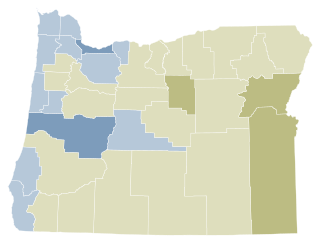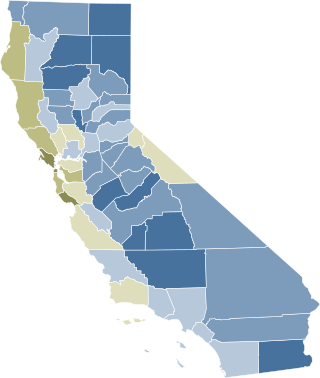
The Natural Law Party (NLP) is a political party in Michigan. It was a national political party in the United States affiliated with the international Natural Law Party. It was founded in 1992. Beginning in 2004, many of its state chapters dissolved. The party's Michigan chapter is still active as of 2022.
In the politics of the United States, the process of initiatives and referendums allow citizens of many U.S. states to place new legislation, or to place legislation that has recently been passed by a legislature on a ballot for a popular vote. Initiatives and referendums, along with recall elections and popular primary elections, are signature reforms of the Progressive Era; they are written into several state constitutions, particularly in the West. It is a form of direct democracy.

The 2004 presidential campaign of Ralph Nader, political activist, author, lecturer and attorney began on February 23, 2004. This was Nader's third presidential campaign, having run in 1996 and 2000 campaign as the candidate for the Green Party; in 2004 he ran as an independent candidate. Nader won the 2002 endorsement of the Reform Party USA, and thus appeared on the ballot as the Reform Party candidate in several states. In some states, Nader was on the ballot as an independent candidate, while in other states, Nader was deemed not to have met the requirements for ballot access.

Ballot Measure 36 was a 2004 initiative in the U.S. state of Oregon. It amended the Oregon Constitution to define marriage as a union of one man and one woman. The initiative passed with 1,028,546 votes in favor, and 787,556 votes against in the November 2, 2004 general election. It is one of a number of U.S. state constitutional amendments banning same-sex marriage. However, unlike other similar ballot measures passed on or near the same election date, the amendment did not explicitly ban civil unions between same-sex couples.
Same-sex marriage in Oregon has been legally recognized since May 19, 2014, when Judge Michael J. McShane of the U.S. District Court for the District Court of Oregon ruled in Geiger v. Kitzhaber that Oregon's 2004 state constitutional amendment banning same-sex marriages discriminated on the basis of sexual orientation in violation of the Equal Protection Clause of the U.S. Constitution. A campaign that was then under way to win voter approval of a constitutional amendment legalizing same-sex marriage was suspended following the decision. In July 2015, Governor Kate Brown signed legislation codifying same-sex marriage in various Oregon statutes. The law change went into effect on January 1, 2016.

Bernard John "Ben" Westlund II was an American politician in the U.S. state of Oregon. A Democrat, he was elected State Treasurer in 2008. Previously, Westlund served in both houses of the Oregon Legislative Assembly, as a Republican from 1996 to 2006, as an independent from 2006 to 2007, and then as a Democrat. Westlund dropped his Republican party affiliation to run for Governor of Oregon in the 2006 election, but dropped out of the race in August. In December 2006 he became a Democrat. Westlund worked as a business analyst, and ran businesses in mining, ranching, and agriculture.

The Oregon Medical Marijuana Act, a law in the U.S. state of Oregon, was established by Oregon Ballot Measure 67 in 1998, passing with 54.6% support. It modified state law to allow the cultivation, possession, and use of marijuana by doctor recommendation for patients with certain medical conditions. The Act does not affect federal law, which still prohibits the cultivation and possession of marijuana.
The Northwest Progressive Institute (NPI) is a liberal think tank based in Redmond, Washington, founded in 2003 and incorporated in 2005. It uses technology, public policy research, and political advocacy to advance progressive causes in the Pacific Northwest region as well as across the United States. It describes itself as "a netroots powered strategy center working to raise America's quality of life through innovative research and imaginative advocacy."

Proposition 8, known informally as Prop 8, was a California ballot proposition and a state constitutional amendment intended to ban same-sex marriage; it passed in the November 2008 California state elections and was later overturned in court. The proposition was created by opponents of same-sex marriage in advance of the California Supreme Court's May 2008 appeal ruling, In re Marriage Cases, which followed the short-lived 2004 same-sex weddings controversy and found the previous ban on same-sex marriage unconstitutional. Proposition 8 was ultimately ruled unconstitutional by a federal court in 2010, although the court decision did not go into effect until June 26, 2013, following the conclusion of proponents' appeals.

Oregon Ballot Measure 64 was an initiated state statute ballot measure on the November 4, 2008 general election ballot in Oregon.

Oregon Ballot Measure 60 was an initiated state statute ballot measure filed by Bill Sizemore and R. Russell Walker. Sizemore referred to it the "Kids First Act." The measure appeared on the November 4, 2008 general election ballot in Oregon.

The 2009 Washington Referendum 71 (R-71) legalized domestic partnership in Washington state, the first statewide referendum in the United States that extended to LGBT people the rights and responsibility of domestic partnership. The bill had passed State Legislature, and it was signed into law by the Governor in May 2009, but opponents gathered enough signatures to put the measure before the voters, who returned ballots by mail over three weeks ending on November 3, 2009, approving the measure 53% to 47%. The new law went into effect 30 days later, on December 3, 2009.

Death with Dignity National Center is a 501(c)(3) nonpartisan nonprofit organization, headquartered in Portland, Oregon, that has led the legal defense of and education about Death with Dignity laws throughout the United States for more than 25 years. The Death with Dignity National Center helped write and defend in courts the nation's first successful assisted dying law, the Oregon Death with Dignity Act, protecting the right of persons with terminal illness to control their own death. The Death with Dignity National Center is affiliated with the Death with Dignity Political Fund, a distinct and separately incorporated 501(c)(4) organization responsible for the promotion of death with dignity legislation in other states around the U.S.

ProtectMarriage.com was a collection of conservative and religious American political activist groups aligned in opposition to same-sex marriage. The coalition's stated goal is to "defend and restore the definition of marriage as between a man and a woman." Beginning in 2001 as Proposition 22 Legal Defense and Education Fund holding the domain name protectmarriage.com, the organization reformed in 2005 as a coalition to sponsor California Proposition 8, called the California Marriage Protection Act, and was successful in placing it on the ballot in 2008. Proposition 8 amended the California Constitution, putting a halt to same-sex marriages in California for nearly two years until the proposition was overturned as unconstitutional. While it was in effect, ProtectMarriage.com defended the amendment in a series of legal challenges. Ron Prentice is the executive director.

Maine Question 1 was a voter referendum conducted in Maine in the United States in 2009 that rejected a law legalizing same-sex marriage in the state. The measure passed 53–47% on November 3, 2009.

Referendum 74 was a Washington state referendum to approve or reject the February 2012 bill that would legalize same-sex marriage in the state. On June 12, 2012, state officials announced that enough signatures in favor of the referendum had been submitted and scheduled the referendum to appear on the ballot in the November 6 general election. The law was upheld by voters in the November 6, 2012 election by a final margin of 7.4% and the result was certified on December 5.

The Massachusetts "Right to Repair" Initiative (2012), also known as Question 1, appeared on the Massachusetts 2012 general election ballot as an initiated state statute. The Right to Repair proposal was to require vehicle owners and independent repair facilities in Massachusetts to have access to the same vehicle diagnostic and repair information made available to the manufacturers' Massachusetts dealers and authorized repair facilities. The initiative passed with overwhelming voter support on November 6, 2012, with 86% for and 14% against. The measure, originally filed four times with the Massachusetts Attorney General, was filed by Arthur W. Kinsman, and was assigned initiative numbers 11–17.

Minnesota Amendment 1 was a legislatively referred constitutional amendment proposed to ban marriage between same-sex couples in the state of Minnesota, that appeared on the ballot on November 6, 2012. It was rejected by 51.90% of voters.
A unified primary is an electoral system for narrowing the field of candidates for a single-winner election, similar to a nonpartisan blanket primary, but using approval voting for the first round, advancing the top-two candidates, allowing voters to confirm the majority-supported candidate in the general election.
Peter Zuckerman is an American journalist and author who has focused his career in court reporting, investigative journalism, and adventure stories. He is also a leader of several prominent progressive political campaigns.















